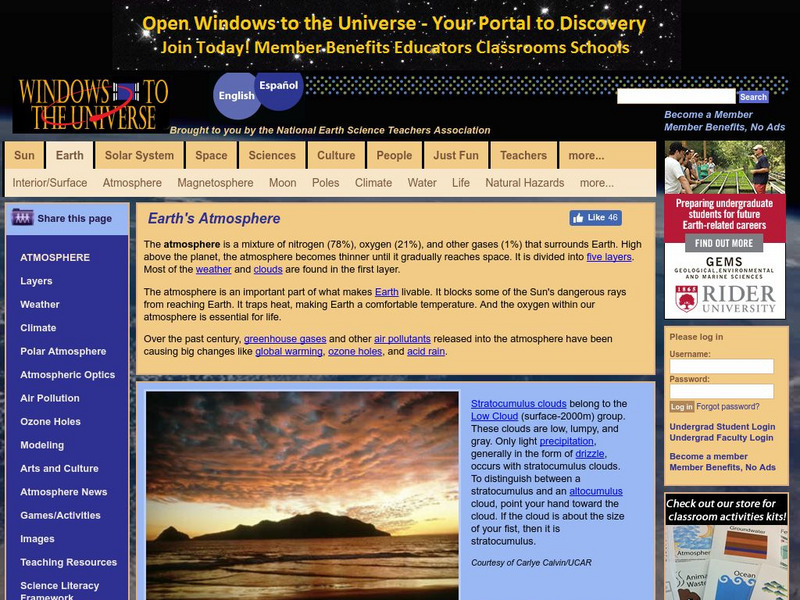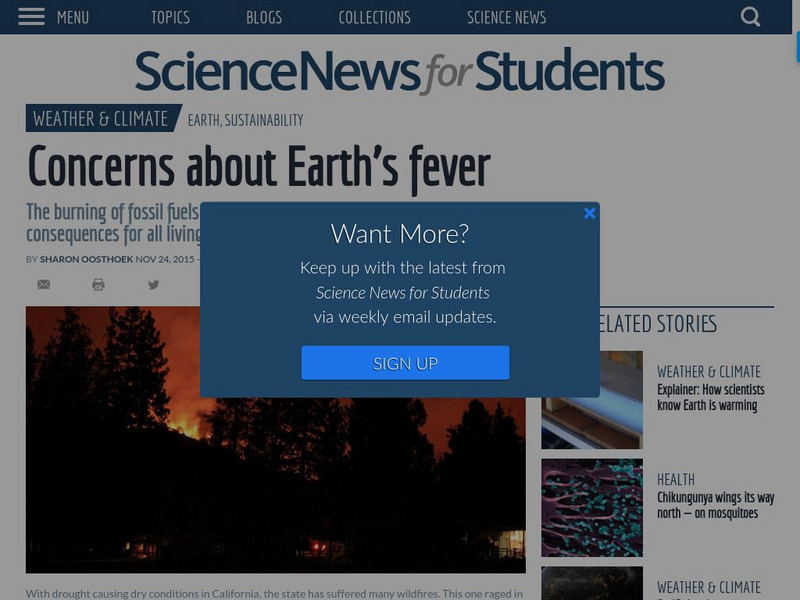Hi, what do you want to do?
TeachEngineering
Teach Engineering: Building a Barometer
Students investigate the weather from a systems approach, learning how individual parts of a system work together to create a final product. Students learn how a barometer works to measure the Earth's air pressure by building a model out...
Ohio State University
Osu: Beyond Weather and the Water Cycle: The Sun: Earth's Primary Energy Source
Extensive article that discusses the first principle of climate science, i.e., that the Sun is the primary energy source for the climate system of the Earth. Presents five concepts for this principle and explains each, providing...
PBS
Pbs Learning Media: Hurricane Matthew Causes Weathering and Erosion
View videos and photos from the aftermath of Hurricane Matthew and see how the earth's landforms changed as a result of the heavy winds and rain. Weathering and erosion made a new landform and dramatically changed the coastline....
PBS
Pbs Learning Media: Climate Change
This video segment adapted from NOVA explains the difference between weather and climate and features groundbreaking analysis revealing that Earth's climate has changed much faster than previously believed. [5:48]
Vision Learning
Visionlearning: Earth Science: The Rock Cycle: Uniformitarianism and Recycling
Instructional module focusing on the rock cycle. Discussion includes the concept of uniformitarianism and how earth materials change from one form to another. The site also includes an interactive practice quiz and links relating to the...
PBS
Pbs Learning Media: Global Climate Change: Understanding the Greenhouse Effect
Students study past climate change, explore the effect of greenhouse gases on Earth's atmosphere today, and consider human impact on global warming.
Climate Literacy
Clean: Investigating Weather and Climate With Google Earth
For this activity, students will investigate the change in global temperature by analyzing data on Google Earth for 13 different cities. Students will then interpret the climate patterns for those cities to make conclusion about the...
King's Centre for Visualization in Science
Explaining Climate Change: Lesson 1: Introduction to Earth's Climate
This is the first lesson in a series of learning modules on the topic of climate change. It explores Earth's unique climate and atmosphere, regional climate differences, and temporal climate differences. Includes comprehension questions...
King's Centre for Visualization in Science
Explaining Climate Change: Lesson 5: The Impacts of Climate Change
This is the fifth lesson in a series of learning modules on the topic of climate change. Using scientific models, it takes a look at the effects of climate change on different parts of the earth. Five key ideas are explored: polar...
PBS
Pbs Learning Media: What's Up With the Weather: Graphs
Examine this graph from FRONTLINE/NOVA: "What's Up with the Weather?" Web site to see dramatic increases in three greenhouse gases over the last two hundred years.
Other
Earth Journalism Network: Climate Commons
A unique interactive tool that embeds news articles and information about climate change into a map of the United States. Users are able to explore what the impact of climate change at a local, regional or national level, as well as...
Other
Bscs: Content Background Earth's Changing Surface
This is written to support and further your content learning about the dynamic nature of Earth's surface. The goal is for you to develop a conceptual understanding of landforms so that you will be able to more effectively teach...
Other
Primer on Climate Change and Human Health [Pdf]
A comprehensive guide to climate change in Canada. This site offers both a national look and then looks at the implications of climate change on specific regions and provinces.
Other
Lehigh University: Climate Change
An inquiry-based science unit for middle school students centered on weather and climate. The lessons integrate technology and lab activities while teaching about Earth system energy balance, greenhouse gases, paleoclimatology, and how...
National Earth Science Teachers Association
Windows to the Universe: The Earth's Atmosphere
Windows to the Universe offers information on the Earth's atmosphere. The site contains links to a weather crossword puzzle and images.
CK-12 Foundation
Ck 12: Earth Science: Air Masses
[Free Registration/Login may be required to access all resource tools.] Air masses greatly influence the the weather in a location.
CK-12 Foundation
Ck 12: Earth Science: Air Masses
[Free Registration/Login may be required to access all resource tools.] Air masses greatly influence the the weather in a location.
Society for Science and the Public
Science News for Students: Concerns About Earth's Fever
Burning fossil fuels is causing the planet to heat up, causing weather patterns to change, sea levels to rise and diseases to spread. Scientists are concerned with the rising temps of Earth.
American Geosciences Institute
American Geosciences Institute: Earth Science Week: Exploring Climate Change With Gis
Use Geographic Information System (GIS) technology to observe climate change with these interactive lessons.
CK-12 Foundation
Ck 12: Fourth Grade: Earth Science: Erosion and Deposition by Flowing Water
[Free Registration/Login may be required to access all resource tools.] Discusses how flowing water causes erosion; describes how runoff, streams, and rivers change Earth's surface; and identifies features caused by groundwater erosion.
Other
Climate Gateway: What Is Climate Change?
This ClimateGateway.com site provides information on what climate change is as well as the factors that affect global climate.
Other
Koshland Science Museum: Earth Lab: Degrees of Change
This resource provides information on all of the aspects of global warming, climate change, and the future of the earth.
NASA
Nasa Earth Observatory: El Nino's Extended Family Introduction
This article discusses cycle of global weather patterns and its relation to El Nino. Learn how global weather patterns are being tracked by satellites and how scientists are predicting weather patterns up to a year in advance.
NASA
Nasa Earth Observatory: Should We Talk About the Weather?
Discover how scientists use the BOREAS to gather data such as heat, carbon dioxide, water vapor, and more to see what role these levels have on climate changes.

















